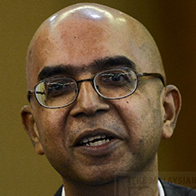 Last week the Wall Street Journal reported a dramatic story about the use of money from 1Malaysia Development Berhad (1MDB) to influence the results of Malaysia’s 13th general election. According to the WSJ, key players in the abominable tale include 1MDB, Genting group and a charity whose chairman is our Prime Minister.
Last week the Wall Street Journal reported a dramatic story about the use of money from 1Malaysia Development Berhad (1MDB) to influence the results of Malaysia’s 13th general election. According to the WSJ, key players in the abominable tale include 1MDB, Genting group and a charity whose chairman is our Prime Minister.
The WSJ, a global opinion-shaper, essentially said companies in the Genting group collaborated with 1MDB in activities designed to unfairly persuade voters to favour Barisan Nasional in GE13: 1MDB, Genting, Yayasan Rakyat 1Malaysia (YR1M) and Prime Minister Datuk Seri Najib Razak abused the trust placed in them by shareholders, donors and the public.
In the language of election offences, Najib was accused of campaign finance misdemeanours. In the language of accounting and ethics, 1MDB and Genting were accused of malappropriation and gratification, while YR1M was accused of engaging in activities beyond its scope.
Bersih 2.0, Malaysia’s publicly endorsed election watchdog, brought the WSJ report to the attention of the prime minister and asked Najib to either rebut the WSJ article or sue the WSJ. Bersih also called upon the Election Commission to respond to the WSJ report by initiating an investigation.
Tan Sri Abdul Aziz Mohd Yusof, the EC chairman, ticked off Bersih. He told Bersih to “collect full and complete evidence and lodge a report with the police or the Malaysian Anti-Corruption Agency (MACC) so that they [not EC] can investigate.”
Was the EC chairman’s response to the WSJ and to Bersih appropriate? What does the EC chairman’s response indicate about the EC?
To answer, we must recall why there’s an EC.
The EC is a creature formed and imbued with a spirit by the Constitution of Malaysia. The Constitution created the EC as the guardian of democracy in the nation. Article 113 of the Constitution is titled “Conduct of Elections.”
Article 113 establishes four functions for the EC: (1) conduct elections to the Federal and state legislatures and other elections authorised by Federal or state law; (2) prepare and revise electoral rolls; (3) review the delineation of constituencies at least every eight years and (4) make rules necessary for the purpose of its functions.
Article 114 requires the Yang di-Pertuan Agong, in consort with the Conference of Rulers, to appoint a chairman, a deputy chairman and five other members; the appointees are required to be persons who will not cause the public to lose confidence in the EC.
Article 114 also establishes the honour of the EC by stipulating that an election commissioner may only be removed from office “in like manner as a judge of the Federal Court.”
Article 115 invests the EC with immense power through this simple command: “All public authorities shall on the request of the Commission give the Commission such assistance in the discharge of its duties as may be practicable . . .”
We may summarise the constitutional specification for the EC by saying that the EC should be diligent, powerful, active and honourable.
Now that you know the constitutional specifications, consider this: if the framers of the constitution were asked to describe what creature the EC should most resemble, what creature do you think they would choose?
Now that you know how the EC chairman responded to the WSJ article and Bersih, consider this: what creature’s characteristics did the EC display?
Next, consider this: on Monday, Bersih 2.0 and the Centre to Combat Cronyism and Corruption (C4) lodged four complaints with the MACC, all based upon the tale reported by the WSJ. Transparency International also urged an investigation.
Does Bersih 2.0 deserve to be called an election watchdog? Why is it barking at the EC? What does the present EC deserve to be called? – July 2, 2015.
* This is the personal opinion of the writer or publication and does not necessarily represent the views of The Malaysian Insider.


Comments
Please refrain from nicknames or comments of a racist, sexist, personal, vulgar or derogatory nature, or you may risk being blocked from commenting in our website. We encourage commenters to use their real names as their username. As comments are moderated, they may not appear immediately or even on the same day you posted them. We also reserve the right to delete off-topic comments